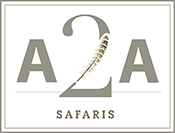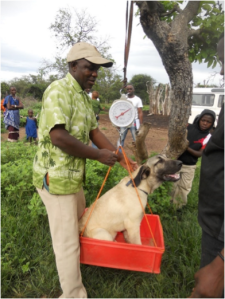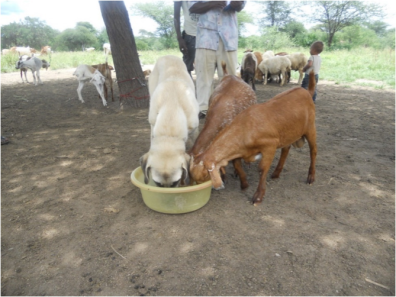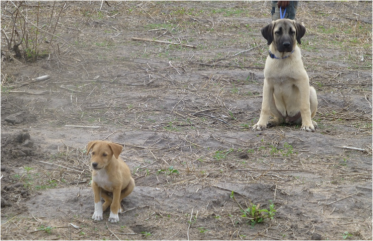Blog
May 13, 2014
Livestock Guarding Dogs as a method of reducing human/wildlife conflict
By Amy Dickman, Director, Ruaha Carnivore Project
The Ruaha Carnivore Project (RCP) is part of Oxford University’s Wildlife Conservation Research Unit, WildCRU. They aim to develop effective conservation strategies for large carnivores in Tanzania’s remote Ruaha landscape. This is one of the most important areas for lions, where approximately 10% of the world’s remaining populations of these cats are found, as well as other globally important species such as African wild dog, cheetah, leopard and spotted hyena. A project implemented by the RCP is to work in partnership with local communities to create solutions to human/wildlife conflict, particularly in preventing livestock losses to predation.
One of the strategies is to use specially bred Anatolian Shepherd dogs to act as guardians to their flocks, a project that has met with some success in Namibia, and is being piloted for the first time in East Africa by the RCP. The program is thus far successful, and below is a report from the RCP detailing an unexpected setback that they have encountered.
Livestock guarding dog project developing well despite recent killing of an LSGD
We had a very sad incident at RCP in March, when one of the four Anatolian Shepherd livestock guarding dogs we placed (Askari) was speared and killed. All efforts were taken to rescue the dog when found by RCP staff, but unfortunately he died before he could be treated by the vets in Iringa.
This was an extremely unusual and shocking event, and something that we would never have predicted – we feared that the dogs might die due to illness in the bush, or being attacked by a carnivore, but this was something none of us had ever worried about. We still don’t know why this happened – it is possible that it was the result of an inter-family feud, or just the result of random hooliganism, and are still investigating. The whole community and RCP team was very upset by this, especially the family concerned and Msago, our community liaison officer.
Despite the spearing of Askari, the guarding dog programme overall looks very promising – the dogs have reached over 7 months old, and are well-fed, healthy, well-bonded to their livestock and are extremely popular within the communities. The dogs are fed a high-protein diet supplied by RCP and have been checked daily. They have grown really well, as shown in the image below – the Anatolian shepherd on the right is only 4 months old here, but dwarfs the village dog on the left, which is the same age.
The guarding dogs are being raised mainly with the goat herds, and we are interested to see how effective they become at scaring off large carnivores. Their job is not to fight an approaching carnivore – instead, they act as a good pair of eyes and ears to alert the herder to carnivore presence, and once detected, they stand between the herd and the carnivore, and bark loudly. This should be enough to deter the predator and prevent losses, but we will test this over time.
Taronga Zoo, Cleveland Metroparks Zoo and the McCaw Foundation mainly support this work, and we are partnering with the Cheetah Conservation Fund (CCF) in Namibia, as they supply the puppies and training. Retaliatory killing after livestock attacks is one of the main threats to carnivores in our study area, so we are hoping that these dogs will play an important role in reducing conflict and killings. We are now planning to bring in more puppies later this year, and also to trial the use of large local dogs, to see how effective they are compared to the Anatolians. This is the first trial of these specialized dogs in East Africa, so the results will help inform future conflict mitigation strategies both in Ruaha and many other important areas where conflict is a significant conservation threat.








































Add comment
By Amy Dickman, Director, Ruaha Carnivore Project
The Ruaha Carnivore Project (RCP) is part of Oxford University’s Wildlife Conservation Research Unit, WildCRU. They aim to develop effective conservation strategies for large carnivores in Tanzania’s remote Ruaha landscape. This is one of the most important areas for lions, where approximately 10% of the world’s remaining populations of these cats are found, as well as other globally important species such as African wild dog, cheetah, leopard and spotted hyena. A project implemented by the RCP is to work in partnership with local communities to create solutions to human/wildlife conflict, particularly in preventing livestock losses to predation.
One of the strategies is to use specially bred Anatolian Shepherd dogs to act as guardians to their flocks, a project that has met with some success in Namibia, and is being piloted for the first time in East Africa by the RCP. The program is thus far successful, and below is a report from the RCP detailing an unexpected setback that they have encountered.
Livestock guarding dog project developing well despite recent killing of an LSGD
We had a very sad incident at RCP in March, when one of the four Anatolian Shepherd livestock guarding dogs we placed (Askari) was speared and killed. All efforts were taken to rescue the dog when found by RCP staff, but unfortunately he died before he could be treated by the vets in Iringa.
This was an extremely unusual and shocking event, and something that we would never have predicted – we feared that the dogs might die due to illness in the bush, or being attacked by a carnivore, but this was something none of us had ever worried about. We still don’t know why this happened – it is possible that it was the result of an inter-family feud, or just the result of random hooliganism, and are still investigating. The whole community and RCP team was very upset by this, especially the family concerned and Msago, our community liaison officer.
Despite the spearing of Askari, the guarding dog programme overall looks very promising – the dogs have reached over 7 months old, and are well-fed, healthy, well-bonded to their livestock and are extremely popular within the communities. The dogs are fed a high-protein diet supplied by RCP and have been checked daily. They have grown really well, as shown in the image below – the Anatolian shepherd on the right is only 4 months old here, but dwarfs the village dog on the left, which is the same age.
The guarding dogs are being raised mainly with the goat herds, and we are interested to see how effective they become at scaring off large carnivores. Their job is not to fight an approaching carnivore – instead, they act as a good pair of eyes and ears to alert the herder to carnivore presence, and once detected, they stand between the herd and the carnivore, and bark loudly. This should be enough to deter the predator and prevent losses, but we will test this over time.
Taronga Zoo, Cleveland Metroparks Zoo and the McCaw Foundation mainly support this work, and we are partnering with the Cheetah Conservation Fund (CCF) in Namibia, as they supply the puppies and training. Retaliatory killing after livestock attacks is one of the main threats to carnivores in our study area, so we are hoping that these dogs will play an important role in reducing conflict and killings. We are now planning to bring in more puppies later this year, and also to trial the use of large local dogs, to see how effective they are compared to the Anatolians. This is the first trial of these specialized dogs in East Africa, so the results will help inform future conflict mitigation strategies both in Ruaha and many other important areas where conflict is a significant conservation threat.